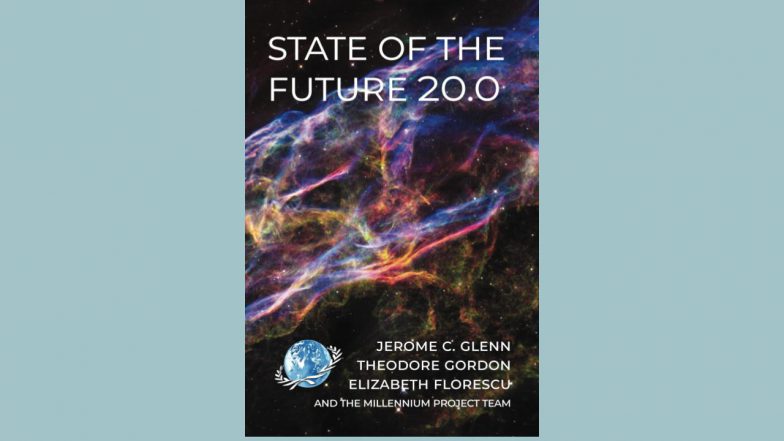Summary
The State of the Future 20.0 is a 500-page broad overview of the issues and opportunities on the future of humanity. It is a detailed and readable look at what we should know today to avoid the worst and achieve the best for humanity.
The Millennium Project, a global participatory think-tank, distilled countless research reports, insights from hundreds of futurists and related experts around the world, and 70 of its own futures research reports, to make this report of immense value.
It offers an Executive Summary and concluding section on the prospects for civilization, plus seven parts. State of the Future’s authors are
Source: Amazon
OnAir Post: State of the Future 20.0
About
Seven Parts
Part 1 summarizes the 15 Global Challenges on sustainable development and climate change, water, population and resources, democratization, foresight and decision-making, ICT and AI for all, rich-poor gap, health and disease, education and learning, war and peace, changing roles of women, organized crime, energy, science and technology, and global ethics. Each topic includes a brief overview, a list of actions, along with their regional considerations.
Part 2, State of the Future Index 2035, integrates 29 variables to show if the future is getting better or worse, and where we are winning and losing.
Part 3, Governing the Transition from Artificial Narrow Intelligence (ANI) to Artificial General Intelligence (AGI), distills insights from 55 of the world’s leading AGI experts on 22 questions on the future of AGI. Drawing on these insights, it identifies 40 national and international regulations and 5 governance models that are assessed by an international 299-member panel.
Part 4, Beneficial AGI Competition, discusses the world of 2045, its issues and opportunities, offering a scenario about a day in 2045 and how AGI could greatly improve life in that day.
Part 5, Five UN Foresight Elements of Our Common Agenda, provides an international assessment of the five foresight elements of the UN Secretary-General’s Our Common Agenda report to make the UN more relevant to the future.
Part 6, World Futures Day, synthesizes the 11th Annual World Futures Day – the 24-hour, around-the-world open discussion on the future, with trend and pattern analysis from previous World Futures Days.
Part 7, Robots 2050, illustrates the future possibilities of AI robots in governments, in daily life, in bed, in the oceans, and in space.
The State of the Future 20.0 is one of the largest, broadest, most detailed publications on future issues and possibilities written. It covers what the globally-minded citizen should know about the future and decision-making today.
Source: https://www.amazon.com/State-Future-Jerome-Clayton-Glenn/dp/B0F4D9ZKN5
Jerome Clayton Glenn
Jerome Clayton Glenn Executive Director, co-founder and CEO of The Millennium Project (established in 1996), is a leader in global futures research. He is the Chairman of the High-Level Expert AGI Panel for the Council of Presidents of the United Nations General Assembly. Alongside Elizabeth Florescu and the Millennium Project Team, he is the lead author of the State of the Future 20.0 report and previous 19 State of the Future reports over the last twenty-eight years. He was the United Nations University (Tokyo) liaison to the USA and the USA liaison to UNU as executive director of the American Council for the UNU from 1988 to 2007.
Glenn was contracted by the European Commission to contribute the AGI paper for their Horizon 2025-2027 program and is a Member of the IEEE SA P2863 Organizational Governance of AI Working Group.
He has consulted for governments, international organizations, and the private sector in areas such as S&T policy, environmental security, economics, education, and futures research methodology. He has been a keynote speaker at over 500 events worldwide and published over 300 articles on the future.
Recently he led The Millennium Project’s research on artificial general intelligence AGI, UN foresight reforms, and work/technology 2050. He was the Deputy Director of Partnership for Productivity International, focusing on economic development for lower income countries and founded CARINET in 1983, a pioneer computer network for the developing world. He sent his first email in 1973.
Glenn is the inventor of the “Futures Wheel” futures technique, concepts like conscious-technology, self-actualization economy, famine brain drain, and tele-nations; and definitions for collective intelligence and environmental security. Saturday Review (1974) listed him among America’s most gifted young leaders for his contributions to tropical medicine (while a Peace Corps Volunteer), future-oriented education, and participatory decision-making systems. His was instrumental in banning FOBS in SALT II.
He is the author Future Mind, Linking the Future, co-author of Space Trek: the Endless Migration and author of the forth coming Global Governance of the Transition to Artificial General Intelligence. He is the co-editor of “Futures Research Methodology” series. Glenn holds a BA in philosophy from American University, an MA in Teaching Social Science—Futuristics from Antioch-Putney Graduate School of Education (now Antioch University New England), and ABD in futures research at the University of Massachusetts. He is a Fellow of the World Academy of Art and Science, Member of the Club of Rome, received the 2022 Lifeboat Foundation Guardian Award (shared with Volodymyr Zelenskyy), and is a leading international boomerang stuntman.
Source: https://www.amazon.com/State-Future-Jerome-Clayton-Glenn/dp/B0F4D9ZKN5#detailBullets_feature_div
Product details
- ASIN : B0F4D9ZKN5
- Publisher : Independently published
- Publication date : April 17, 2025
- Language : English
- Print length : 582 pages
- ISBN-13 : 979-8301430121
- Item Weight : 2.12 pounds
- Dimensions : 6 x 1.32 x 9 inches
- Best Sellers Rank: #2,860,916 in Books (See Top 100 in Books)
- #1,666 in International Diplomacy (Books)
- #2,545 in National & International Security (Books)

